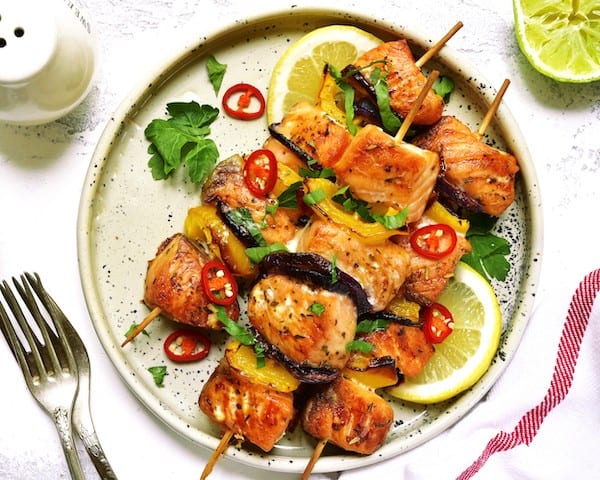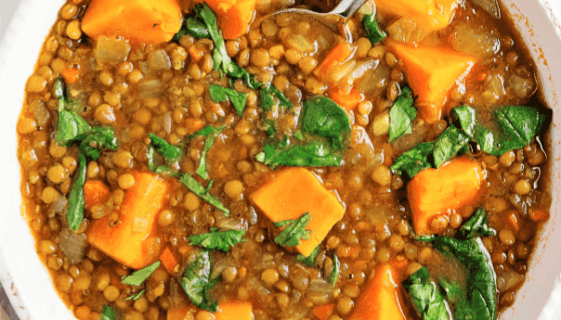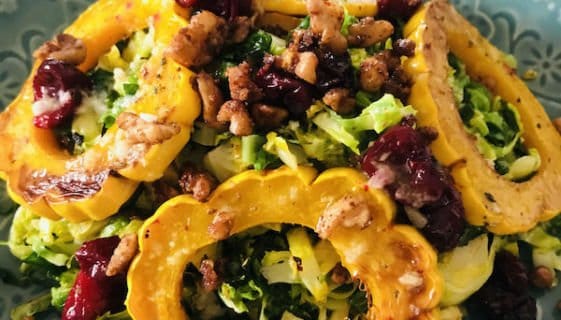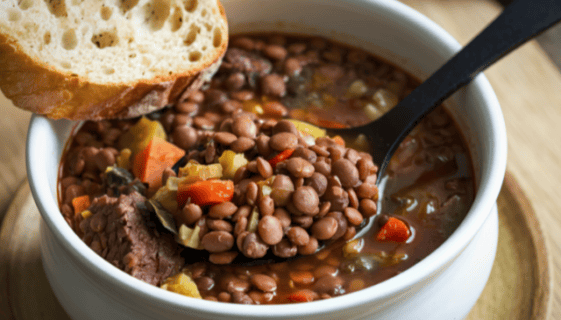For many of us, summertime means grilling. One of the quickest and tastiest ways to use the grill is to make kebabs (also known as skewers). Kebabs make cleanup very easy, but they also delight with endless flavor and texture combinations. Our kebabs alternate fish or tofu with colorful seasonal veggies, marinated in a garlicky, herbaceous tasty mixture and grilled to perfection, crispy on the outside and tender on the inside. Tasty on their own, we decided to punch up the flavor by pairing the kebabs with our grilled watermelon salsa. If you've never grilled summer fruit like watermelon, it's time to give it a try! Throwing fruit on the grill gives it a subtle, smoky flavor while caramelizing the natural sugars, elevating its sweetness to the next level, and making it irresistibly refreshing when paired with the grilled tender fish or tofu kebabs.
Ingredients
Marinade
- ¼ cup fresh dill
- ¼ cup fresh cilantro or parsley
- 4 cloves garlic
- 1 tsp cumin
- ½ cup oil
- ¼ cup vinegar or lemon juice
- ½ cup watermelon
- ½ tsp salt and pepper
- ½ tsp red pepper flakes
Kebabs
- 2 ½ lbs. salmon cut into 2-inch cubes or 1 14-ounce package extra firm tofu, drained, pressed and cut into 2-inch cubes
- 1 bell pepper (any color), cut into 1 inch pieces
- 1 zucchini, sliced into ½ inch thick rounds
- ½ red onion, cut into ½ inch wide pieces
Grilled Watermelon Salsa
- 6 ½ inch thick half-moon slices of watermelon with rind still attached (~2 cups)
- High heat oil (avocado, sunflower, coconut)
- ¼ tsp paprika
- ½ tsp salt
- 1 pint cherry tomatoes, quartered
- ¼ red onion, diced
- 1 jalapeno, diced
- 2 limes, juiced
- 2 tbsp cilantro or parsley
- Salt to taste
Optional toppings:
- Fresh herbs
- Chilis
- Squeeze of lemon
Directions
- Place all marinade ingredients in a blender or food processor and blend until herbs are small pieces. Reserve ¼ of marinade.
- Next, build the kebabs.
-
- If using wood skewers make sure to soak them in water for 10 minutes before using.
- Alternate between bell pepper, tofu or fish, zucchini, tofu or fish, onion, repeat. Use a pepper or onion at the ends of the skewers to prevent pieces from breaking off.
- Roll kebabs in marinade to ensure all sides are coated and set aside for at least 30 minutes in marinade in the refrigerator.
- Preheat the grill to medium-high heat (~400 degrees).
- Brush the watermelon slices with oil and sprinkle with paprika and salt. Place watermelon slices on grill for 1-2 minutes per side until light grill marks are visible. Remove and set aside to cool.
- Once watermelon cools, cut flesh from rind and cut watermelon into a small dice.
- Add watermelon and remaining salsa ingredients to a bowl and gently mix, taste and adjust seasoning.
- Set salsa aside while cooking kebabs. Take half an onion and rub it on the grill grates to make it nonstick or rub with a small amount of oil. Once kebabs have marinated for 30 minutes do one final roll in marinade and place directly on preheated grill. Make sure to spread the skewers apart over grill.
- Cook fish for 6-8 minutes per side and cook tofu for 10-12 minutes per side. The skewers should be easy to flip, if not allow fish or tofu to cook an additional 1-2 minutes until easy to flip.
- Place cooked kebabs on a serving dish and brush with reserved marinade. Top with salsa or serve on the side.
Recipe Notes: If you do not have a grill you can cook the kebabs on a baking sheet in a 400 degree oven, for the same cooking time. You can also broil the watermelon for 1-2 minutes per side or just use fresh watermelon for the salsa and it will still be delicious.
Watermelon: Helps us regulate hydration due to its high amount of water and electrolytes. It is also packed full of detoxifying components such as potassium, magnesium, anthocyanins and a specific amino acid called citrulline (that helps remove toxins from the kidneys). Contains high amount of lycopene and vitamin C.
Salmon: When purchasing salmon from a fish counter or fish market, ask to smell before purchasing. The salmon shouldn’t have a fishy smell. Fish should always smell clean and fresh. Generally you want to cook it the same day or day after purchase. Salmon is packed full of essential omega-3 fatty acids to support brain and joint health, lower inflammation and reduce the risk of cardiovascular disease.
Bell Peppers: All colors of bell peppers are from the same plant. A bell pepper starts out green and as it ripens will become yellow, orange or red depending on its variety. As the bell pepper ripens there is also an increase in the nutrient concentration, with orange and red having the highest. Bell peppers have high amounts of antioxidants called carotenoids that help protect cells from oxidative damage.
Tofu: One of the few plant-based protein options that is considered a complete protein (contains sufficient amounts of all essential amino acids). Tofu has anti-inflammatory compounds and beneficial isoflavones that can protect the heart, improve insulin sensitivity, and reduce the risk of breast, digestive system and prostate cancers.
Garlic and Onions: Considered a prebiotic, meaning it feeds the “good” bacteria in our gut and promotes a healthy digestive system. Research supports that the compounds such as allicin in garlic and onions have antioxidant, anti-inflammatory, antimicrobial, and cardioprotective properties.
Tomatoes: A great source of lycopene that helps reduce the risk of cancer and heart disease and protects skin integrity. Cooking tomatoes in a healthy fat (such as olive or avocado oil) increases the amount of available lycopene that the body will absorb.
Zucchini: Nutrient-dense vegetable packed full of fiber and water that aids in digestive health. The insoluble fiber helps us stay regular and the soluble fiber is a “prebiotic” food for the good bacteria to promote a healthy gut. This vegetable’s high amount of zeaxanthin (a powerful antioxidant) also plays a role in preventing oxidative stress to reduce the risk of developing cancer.
Dill, cilantro and parsley: Contain a range of protective vitamins such as Vitamins A, C, and K, and packed full of antioxidants that help reduce oxidative stress in the body. Such antioxidants are lutein, beta-carotene, and zeaxanthin, which not only are known to reduce the risk of cancer, but also can prevent age-related macular degeneration and support liver health.
Citrus juice and zest: Packed full of a multitude of nutrients such as vitamin C, flavonoids, and fiber which aid in vascular protection, reduce inflammation, improve gastrointestinal function and health, and play an important role in preventing diabetes, cancer, and neurological disease. The vitamin C in the lemon juice will aid in the intestinal absorption of iron from plant-based sources.



 Ananda Kaplan
Ananda Kaplan


